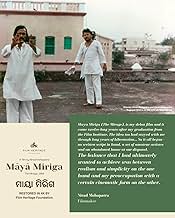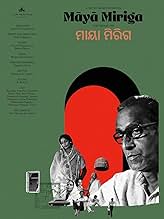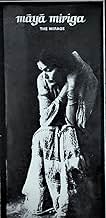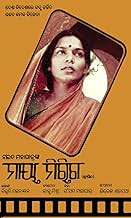Ajouter une intrigue dans votre langueThe story is of a family, where three generations live under a decaying roof. The film is about certain emotional bonds which make up a way of life and the painful realization that they can ... Tout lireThe story is of a family, where three generations live under a decaying roof. The film is about certain emotional bonds which make up a way of life and the painful realization that they can not last.The story is of a family, where three generations live under a decaying roof. The film is about certain emotional bonds which make up a way of life and the painful realization that they can not last.
- Récompenses
- 1 victoire au total
Histoire
Le saviez-vous
- AnecdotesFinal film of Sujata Rubener.
Commentaire à la une
Maya Miriga - the Mirage was the first and the only feature film directed by Nirad Mohapatra. The film was highly acclaimed and has won several awards in India and internationally. It certainly is a milestone in Odia cinema and a period piece that captures the breakdown of a joint family in the mid 1980s. For me, the mark of an excellent film is when you watch it, you forget that it is a film! Only a few directors can do that and Nirad Mohapatra has done that with Maya Miriga. When I saw it for the first time while I was in Zurich, I forgot that I was in Zurich! For 115 mins, I was back in my childhood with my family in my country.
It is a simple story that depicts the family dynamics in a joint family where three generations live under one roof. Raj Kishore Babu (Satpathy) is a school headmaster on the verge of retirement who lives with his mother, wife, four sons and a daughter in Puri (a small coastal town in Odisha). His eldest son Tuku is married to Prava (Manaswini) and they have a baby daughter. The second son Tutu (Sampad Mahapatra) gets a prestigious government job and his marriage is arranged with a spoiled and selfish daughter of a rich family (played by Sujata). Sujata is unwilling to stay in the joint family and so begins the fragmentation of the joint family of Raj Kishore Babu. Tutu and his wife leave and the eldest son Tuku also plans to leave home soon with his family for a better job in another city. At the end of the film, in a particularly poignant scene, Raj Kishore Babu, while playing with his granddaughter asks her "will you too also leave us".
The loneliness of elderly parents abandoned by their adult children is also heartrendingly portrayed as the friend with whom Raj Kishore Babu takes walks tells him about his son in America who keeps telling him that he is coming back to visit him but never does!
Mohapatra has great compassion for the characters as he addresses the conflict, as well as the love and closeness that exists in a joint family. The cinematography by Raj Gopal Mishra is outstanding in capturing Nirada Mohapatra's vision for the film. Every scene is like a vintage painting: the saris drying on the clothesline, the eldest daughter in-law lighting the coal fire, the safety pin in her bangles, the government calendar and the clock on the wall, mosquito netting over the bed, the earthenware jug for water on the wooden stand, the lounge chair on the veranda, the weathered yet stately house painted in ochre! Mohapatra has taken ordinary household scenes and made those extraordinary and unforgettable.
None of the cast had ever acted before except Manimala (the mother) who was a renowned stage and screen artist. Particularly notable is the role of the grandmother played by Kishori Devi, who was 75 at the time! Manaswini is flawless in her role as the ideal eldest daughter-in-law of the house. Not only she is exquisitely beautiful, but also emotions wash over her face like rainwater on the windowpane. The direction by Mohapatra is so subtle and the acting is so natural that one would never realize that the actors had never acted before!
Nirad Mohapatra as a director belongs in the same pantheon as Satyajit Ray and Ingmar Bergman! This film brings back memories steeped in nostalgia. This is a beautiful, lyrical, and poignant film directed by the creative genius Nirad Mohapatra! Although he made many documentaries after Maya Miriga, it is such a pity that he never made another feature film! He has made a film that is so great in its simplicity that it is amazingly stellar!
It is a simple story that depicts the family dynamics in a joint family where three generations live under one roof. Raj Kishore Babu (Satpathy) is a school headmaster on the verge of retirement who lives with his mother, wife, four sons and a daughter in Puri (a small coastal town in Odisha). His eldest son Tuku is married to Prava (Manaswini) and they have a baby daughter. The second son Tutu (Sampad Mahapatra) gets a prestigious government job and his marriage is arranged with a spoiled and selfish daughter of a rich family (played by Sujata). Sujata is unwilling to stay in the joint family and so begins the fragmentation of the joint family of Raj Kishore Babu. Tutu and his wife leave and the eldest son Tuku also plans to leave home soon with his family for a better job in another city. At the end of the film, in a particularly poignant scene, Raj Kishore Babu, while playing with his granddaughter asks her "will you too also leave us".
The loneliness of elderly parents abandoned by their adult children is also heartrendingly portrayed as the friend with whom Raj Kishore Babu takes walks tells him about his son in America who keeps telling him that he is coming back to visit him but never does!
Mohapatra has great compassion for the characters as he addresses the conflict, as well as the love and closeness that exists in a joint family. The cinematography by Raj Gopal Mishra is outstanding in capturing Nirada Mohapatra's vision for the film. Every scene is like a vintage painting: the saris drying on the clothesline, the eldest daughter in-law lighting the coal fire, the safety pin in her bangles, the government calendar and the clock on the wall, mosquito netting over the bed, the earthenware jug for water on the wooden stand, the lounge chair on the veranda, the weathered yet stately house painted in ochre! Mohapatra has taken ordinary household scenes and made those extraordinary and unforgettable.
None of the cast had ever acted before except Manimala (the mother) who was a renowned stage and screen artist. Particularly notable is the role of the grandmother played by Kishori Devi, who was 75 at the time! Manaswini is flawless in her role as the ideal eldest daughter-in-law of the house. Not only she is exquisitely beautiful, but also emotions wash over her face like rainwater on the windowpane. The direction by Mohapatra is so subtle and the acting is so natural that one would never realize that the actors had never acted before!
Nirad Mohapatra as a director belongs in the same pantheon as Satyajit Ray and Ingmar Bergman! This film brings back memories steeped in nostalgia. This is a beautiful, lyrical, and poignant film directed by the creative genius Nirad Mohapatra! Although he made many documentaries after Maya Miriga, it is such a pity that he never made another feature film! He has made a film that is so great in its simplicity that it is amazingly stellar!
- joymansinha
- 10 janv. 2021
- Permalien
Meilleurs choix
Connectez-vous pour évaluer et suivre la liste de favoris afin de recevoir des recommandations personnalisées
Détails
- Date de sortie
- Pays d’origine
- Langue
- Aussi connu sous le nom de
- The Mirage
- Lieux de tournage
- Société de production
- Voir plus de crédits d'entreprise sur IMDbPro
- Durée2 heures
- Couleur
Contribuer à cette page
Suggérer une modification ou ajouter du contenu manquant

Lacune principale
By what name was Maya Miriga (1984) officially released in Canada in English?
Répondre
















